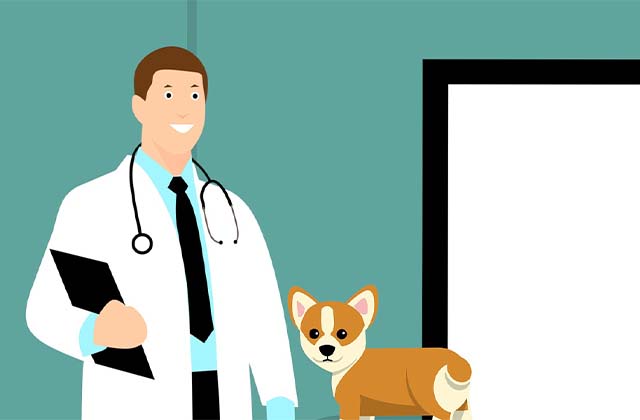
Can Fleas Kill A Dog? Here’s All You Want To Know
Fleas can be extremely annoying and tenacious if you’ve ever had to deal with them. These microscopic parasites, which are only a few millimeters long, are thin and wingless, and they can be extremely harmful to both people and animals.
Over the years, more than 15 different species of fleas have been discovered in domestic dogs. It turns out that dogs may be the ideal hosts for transmitting diseases caused by fleas into homes.
We are all aware of how itchy and unpleasant fleas can be, as well as how difficult they are to eradicate. However, can fleas kill a dog? Can a dog actually die from these bothersome parasites? We asked a veterinary specialist to clarify the situation.
Keep reading.
Table of Contents
Can Fleas Kill A Dog?
“The short answer is yes,” says Dr. Tyra Davis Brown, who practices at Hammond Animal Hospital and Pet Lodge in Louisiana, “and I’ve witnessed it occur in a patient.”
Brown is referring to a condition known as flea anemia, which, if left untreated, can actually result in a dog’s death.
According to Brown, outdoor fleas are a year-round problem in the warm South because there aren’t often enough hard freezes to kill them off. At work, she noticed a bunch of little dogs that the owner had repeatedly been informed about having fleas on them but who kept coming in anyway. During one of her visits, she observed that one of the sickly dogs had fleas. Blood work that Brown ordered revealed severe anemia. She advised the owner to take care of the flea problem right away. A few weeks later, when the dog came back, the fleas were still present and his blood work was even worse.
Brown recommended a specialist, but the dog passed away soon after. “It was the fleas,” she says. “Except for the severe flea infestation, he had no other medical issues. That directly caused his anemia.”
“We don’t see it often,” Brown says of flea anemia that’s severe enough to kill a dog, “however, as in this case, it can and does happen.”
And when it comes to canine flea-borne diseases, anemia isn’t the only issue. Bartonella is an infection brought on by bacteria that fleas may carry, and it can also be spread by fleas. According to Brown, Bartonella is curable with antibiotics but if left untreated can cause fatal heart inflammation in dogs and can even spread to people.
What Are Fleas?
All animals, including dogs, frequently struggle with flea infestations. The fur on your dog’s stomach is frequently home to these minuscule, flat insects, which crawl all over their body. Although adult fleas require blood to feed, most dogs contract the parasites as puppies.
Even on the chilliest winter days, fleas can survive. These insects can reproduce very quickly; a single female can give birth to up to 25 nymphs in a single week. If a flea infestation is not immediately treated, it will spread further, making the affected person itchier. Fleas can actually spread illnesses if left untreated.
Fleas have the potential to trigger allergic reactions that result in intense skin itchiness. Although uncomfortable, these responses are not harmful. However, they do need medical attention to be treated. By keeping the fleas in your home from reproducing, you can avoid getting bitten by them.
If you regularly treat your pets with topical or oral insecticides that work against fleas, you can prevent flea infestations. Make sure to treat your pets during the summer if they are susceptible to fleas, even if they are kept outside.
Eliminating pet food, crumbs, and other potential sources of flea food should be helpful. Another critical step to permanently getting rid of fleas is treating your home. It is possible to apply a spray or granular treatment at home. Additionally, tapeworms and the bubonic plague are among the illnesses that fleas can spread.
Some fleas, like the cat flea, can transmit illnesses to both humans and animals. Pets experience itchiness and irritation from cat flea bites. Hair loss is a result of persistent irritation and excessive licking.
Both humans and pets may develop allergies as well as skin inflammation from these diseases. Scaling, hair loss, and ulcers are the most typical symptoms of this type of cancer. It’s crucial to get a cat to the vet as soon as possible if it displays any of these symptoms. If your cat is prone to getting fleas frequently, you might even want to make an appointment right away.
How Can Fleas Kill My Dog?
The frequent but frequently disregarded threat of fleas to dogs. Your pet may contract a number of illnesses from fleas, including tapeworms. The telltale signs that your dog has fleas are itchy skin and flea bites. If your dog has fleas, you can treat them with over-the-counter medications or ask your veterinarian about prescription remedies. There are many different brands available if you choose to buy medicines from your veterinarian.
Revolution and Frontline Plus are a couple of the most well-liked products. Each medication comes in a wide variety, so picking the appropriate one is crucial. We are your neighborhood, welcoming veterinary clinic; stop by by making an appointment. To keep your pet safe from fleas, we can suggest the best treatment. Ask a member of our vet clinic staff to check your dog for ticks, fleas, and other infestations while you’re there.
It’s important to treat your dog immediately because fleas are a “jump-on” bug. They are capable of causing anemia and, in some cases, death. As a result, as soon as you notice a flea on your pet, remove it. Don’t let them grow into a concern. Before they cause problems or worse, get rid of all the fleas that are currently on your pet.
If your cats come into contact with any other animals while you’re performing the procedure, they could become infested with a large number of fleas because they are easily transmitted between animals. This happens frequently in homes with numerous animals. If you have multiple cats or a dog and a cat, you should start this process as soon as possible.
Also, be sure to take extra precautions when visiting dog shows or other locations where there are animals that could bring fleas home with them. Many people mistakenly think that these bites are caused by mosquitoes because they can resemble mosquito bites very closely. Although they frequently bite and occasionally cause the same symptoms, they are typically quite small.

A Closer Look At Flea Anemia
In dogs, anemia occurs when the body lacks sufficient red blood cells, hemoglobin, or both. There are numerous illnesses, wounds, and conditions that can result in it, including flea-related blood loss. That is because fleas are parasites and do more than just itch when they bite. Every day, multiple times, each adult flea actively suckers blood from its host. A dog is losing blood at a faster rate the more fleas it has. And as we are all aware, a healthy body depends on having enough blood.
“If you have parasites constantly sucking your blood, your body can compensate for a while,” Brown says. “However, if you run out of blood after that, everything will stop working. Your cells will begin to degenerate. A malfunction in your immune system is possible.”
Specifically dangerous for small dogs, according to her, is flea anemia. “A big dog could get anemia from fleas, but the likelihood of death is slimmer compared to a tinier dog,” she says. Big dogs have more blood than small dogs, so it is simpler for their bodies to survive losing some of it. Little dogs have a lot less blood to spare.
According to Brown, the symptoms of anemia to look for in dogs include
- Pale gums (instead of the usual bubblegum-pink color)
- Increased fatigue and loss of stamina
- Loss of appetite
- Panting or gasping for breath
- Some dogs may also begin seeking warmth in ways they didn’t before
Brown advises treating fleas on your dog right away if you notice any. “When you see one flea on your dog, you should know there are probably a hundred more,” she says. And if you are unable to quickly eradicate the fleas or if you notice any anemia symptoms, take them to the vet right away.
Other Flea Diseases
Despite the fact that some of the illnesses or conditions that fleas can spread rarely result in a dog’s immediate demise, they can still make a puppy feel sick or uncomfortable.
The most common cause of skin disease in dogs is flea allergy dermatitis. When fleas bite, their saliva is injected into the body, causing the reaction. “All it can take is one flea to set the skin off,” Brown says. “The reaction will be worse if that one flea multiplies into a hundred or even just ten.” The itching from a single flea bite can last for days in some dogs, and in severe cases, hair loss from the middle of the back to the base of the tail may develop.
Fleas can also cause tapeworms in dogs. When a dog licks itself, a flea carrying a tapeworm is swallowed by the dog. The good news: “I’ve never seen a dog die from a tapeworm infestation,” Brown advises that you call your veterinarian as soon as you notice any indications of tapeworms in your dog’s feces.
Understanding Flea Treatments
Sprays, powders, and shampoos are a few flea-treatment options. In order to get rid of fleas, flea treatments can be applied to both animals and the environment. In order to scratch themselves, dogs and cats frequently cause lesions, sores, and pustules on their skin. When they keep popping up, they can be uncomfortable and difficult to manage.
The use of over-the-counter remedies like sprays, shampoos, and wipes can be very beneficial. But in many instances, one or more of these remedies might not be effective for your pet. If your dog or cat is experiencing this, you might want to try a stronger medication by ordering it from us.
For both humans and animals, flea treatments can be a challenging and expensive process. Nearly all pet owners eventually have to deal with the problem of fleas. When you notice a flea, it’s important to treat your entire family with the appropriate medication because these pests can carry and spread diseases to humans and other animals.
For animals with flea problems, a flea treatment is crucial. Fleas can put an animal through months of discomfort in addition to carrying a number of diseases. Even though there are many flea treatment options available at pet stores, some of them are of poor quality. For the breed of your pet, it might be best to get in touch with us.
It is best to ask a professional’s opinion (i.e. the Tuscawilla Animal Hospital) before using any. These products, Frontline, Advantage, and Vectra, should all be used monthly on dogs in order to effectively eliminate fleas from their fur. Additionally, there are fantastic topical medications for cats like K9 Advantix that are very effective at keeping mosquitoes, ticks, and fleas away.
Both our pets and ourselves should receive flea treatment. Without it, fleas can spread serious illnesses and diseases that are potentially fatal to our animal friends. These tiny bugs, however, not only affect animals; they also spread disease and illness to people. And although they can go more than 100 days without eating, they typically only live for two to three months.
Thankfully, fleas do not live on people. They usually jump from an infested pet or another animal, but it’s most likely from an infested pet bed, and bite down at the feet, ankles, and legs. A flea bite could also develop an infection.
If a person is bitten by a flea, they might experience symptoms like swollen glands, excruciating pain at the bite site, or excessive redness. You should consult a doctor if you have been bitten by a flea. In some cases, fleas can spread diseases like cat scratch fever, plague, typhus, and flea-borne spotted fever through bites.
With this in mind, it’s crucial to use the proper flea treatment and get rid of any other bugs that may be present. Additionally, certain areas might be more susceptible to fleas than others depending on the time of year and your location. Fleas and other insects can gather especially well in areas with a lot of brush. If these areas are present on your property, you might want to consider using a flea treatment there.
Flea Prevention Tips
“Every animal should be on some type of [flea] preventative 12 months out of the year—especially if you live in a warmer climate where you don’t get hard freezes a lot,” There are many options available, ranging from topical remedies to oral medications, according to Brown. Just make sure that whatever you use specifically states that it will combat fleas.
The CDC suggests limiting how much time your pet spends outside, giving frequent baths, and regularly checking for fleas. It also suggests frequently washing pet bedding in soap and water.
According to Brown, it’s crucial to vacuum your home at least twice a week and to empty the bag right away. Eggs can hide in the gaps between planks, so you should also sweep and mop bare floors.
“We can’t make fleas vanish entirely,” Brown adds, “but you can keep them out of your home and off your pet.”
Get Fleas Out Of Your Home
Getting rid of the fleas on your dog is only a small portion of the issue. Additionally, you must figure out how to eradicate fleas from your home. Patience is necessary in this. Due to the length of time it takes for all of the fleas in your home to complete their life cycle, an infestation may take up to three to four months to completely eradicate.
Here are the steps you need to take to eradicate fleas in your home:
- In hot, soapy water, wash all dog beds and soft dog toys. Do this repeatedly until the infestation is over.
- Any blanket or cushion where your dog likes to sleep should be washed in hot water, along with your own bedding, throw rugs, bath mats, and any other items.
- All upholstered furniture, curtains, hardwood floors, linoleum, and tiled floors should be vacuumed. Then, immediately dispose of the vacuum bag in an outdoor trash can. To make sure all of the stages are taken care of, you must vacuum frequently.
- Choose and use an environment-friendly flea control spray or fogger that will treat all flea life stages, or dial your neighborhood exterminator.
- Pick a flea treatment for your yard, whether it be a spray, pellet, or nontoxic option. Maintaining short grass and shrubbery will also keep fleas and ticks out of your yard. In order to prevent raccoons, rabbits, and other animals that carry fleas from entering your yard, patch fences.
- You should vacuum the seats if your dog has recently traveled in your car.
- Continue giving a monthly preventative to your dog and any other pets.
- During flea season, keep your dog away from unfamiliar dogs and make sure his puppy playmates are flea-free.
Read about How Much Insulin Does It Take To Kill A Dog?




